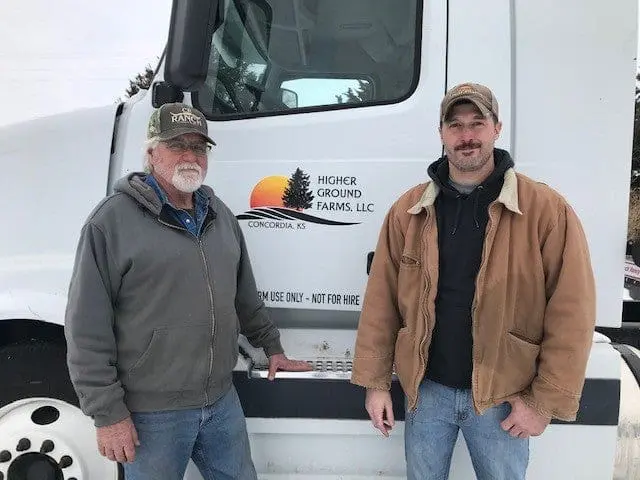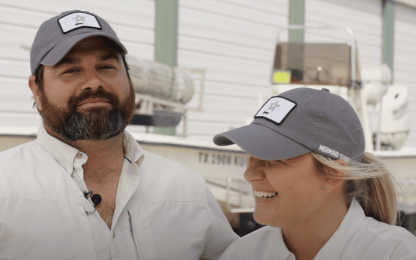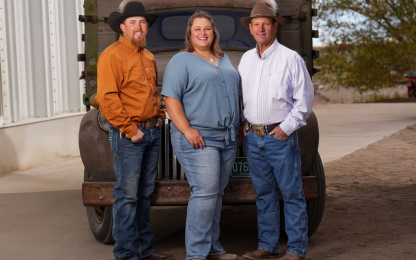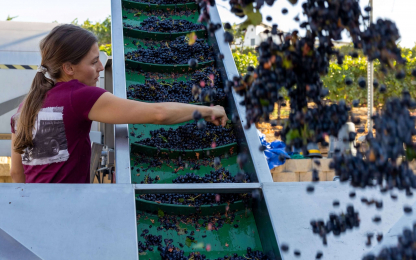Bryan Cleveland, a former teacher and Marine, is committed to implementing a new method of farming. He uses cover crops on the nearly 2,000 acres he and his dad, Mike, farm near Concordia, Kansas.
“We’re really into re-energizing the soil, using various cover crops and trying to cut our input costs as well,” Bryan said.
Carrying on the family legacy
Bryan’s family has been farming in this part of Kansas since 1871. His great-great-grandfather first arrived in Kansas, from New York, when he was 21 years old. As a young man interested in agriculture, he used the pension his grandfather had received when he lost an arm fighting in the war of 1812 to start a homestead in Kansas.
While Bryan doesn’t farm the original piece of land that his great-great-grandfather did, he carries on that 150+ year family legacy right across the road, as a fifth-generation family farmer.
Soil health and evolving agricultural practices
Bryan and his dad are proud to carry on the family legacy while continuing to evolve the conservation practices they use on the family’s land.
“While my grandfather raised some great crops, my dad and I have decided that committing to no-tillage and the utilization of cover crops are a better fit for the goals we want to accomplish as farmers,” Bryan said.
A couple of those goals include improving soil health and preventing erosion. From Bryan and Mike’s research, planting cover crops could be a great way to accomplish both and make their operation more sustainable to a changing climate.
“A freshly tilled field looks nice, but I like the sight of a field with something growing in it. You can just pull up a turnip or something that’s part of the cover crop and the soil is nice and black and it’s crumbly and holding moisture.”
While Bryan and Mike may be the some of the only farmers in their area adopting these practices, they plan to plant cover crops across all the nearly 2,000 acres that make up their farm.
Feeding the microorganisms too
For Bryan, feeding the microorganisms in the soil is just as important as feeding the crops, because healthy soil means healthy crops.
“One of our biggest input costs each year is fertilizer,” Bryan said. “Although injecting fertilizer has helped us achieve high yields, to me … the right thing to do is to let mother nature do what it’s supposed to do with the microorganisms that are in the soil. They have the ability to breakdown nutrients that already exists in the soil, but aren’t readily available to the plant”
“We’ve learned that if you don’t have anything growing in the soil then those microorganisms die and go away because they don’t have anything to feed on. So that’s why the cover cropping year-round and planting into the cover crop really is crucial to keep those microorganisms there.”
Getting into agriculture, a circuitous path
Bryan’s passion for cover crops and profit margins, planting and harvesting, is apparent to anyone who speaks with him, and it might surprise some to learn farming is his third career.
After college, Bryan taught social studies in Manhattan, Kansas. With many of his students from nearby Fort Riley, the conflicts in Iraq and Afghanistan were top of mind for everyone.
Those frequent conversations about military conflicts inspired Bryan to join the armed forces. “I felt that if I didn’t join, I would regret it when I was 80 years old sitting in my recliner,” Bryan said. “I wanted to be a part of it and do anything I could to help out. So that’s why I joined the Marine Corps.”
He spent ten years in the Marine Corps, serving as a logistics officer through two deployments to Afghanistan. “I had really, really good experiences and would have loved to have done another 10 years. But an opportunity to come back and farm with my dad – I didn’t want to pass that up,” he said.
A connection across interests
Bryan’s set of experiences, while vast, share a common idea: the need for thinking ahead.
“As a logistics person in the Marine Corps, you’re always thinking about how to be more efficient, always thinking about different variables that could go wrong and doing a lot of planning to make sure they don’t,” Bryan said. “Farming’s the same way. You have to plan ahead quite a bit. And, again, there are a lot of variables: what kind of seed and chemicals you’ll use, whether or not you’re going to cover crop, use no-till or full-till and those kinds of decisions have a huge impact.”
The importance of good partners
New to agriculture, Bryan has relied on support from strong partners starting out. The first of those is his dad.
“As a beginning farmer, I would never be able to do this on my own, without my dad as a mentor,” Bryan said. “He gave me the opportunity to come back and farm with him and do what I’ve always wanted to do. I will be forever grateful for that. We might not always agree, but I love working with him.”
Bryan has also relied upon the Farmer Veteran Coalition for support. In 2018, he had purchased his first piece of farm equipment, a combine. However, the machine didn’t have all the GPS components he needed. That’s when he applied for and received a Fellowship Fund grant through the Farmer Veteran Coalition.
For Bryan, FVC has been an important partner in helping him start his farming operation, something he has watched FVC do for many other farmer veterans in similar positions. “FVC is definitely a good organization for beginning farmers and veteran farmers entering agriculture like myself. We really need as much help as we can get, especially financially, and FVC has been really helpful with providing some starter money to get things moving,” Bryan said.
A partner in Farm Credit
Another partner that’s supported Bryan is American AgCredit. The Clevelands have been Farm Credit crop insurance customers for years. So, when Bryan wanted to buy another quarter section of land, he worked with American AgCredit and the Farm Service Agency (FSA) to develop a low-interest plan for financing the purchase. In the end, Bryan did not make the purchase. However, he feels prepared to attempt other acquisitions in the future, knowing that he can call upon American AgCredit for support.
“The folks at AgCredit are easy to work with, and anytime you try and get a hold of them about a question they’re very responsive,” Bryan said. “I have a lot of trust in my dad and he has a lot of trust in AgCredit. These guys are good to work with and they’re always there to answer questions very quickly.”
Looking ahead
When Bryan first got into agriculture, one of his primary goals was to continue to grow the operation in terms of number of acres farmed. However, having reached nearly 2,000 acres, he feels comfortable.
“I don’t think that having a lot of land necessarily means you’re more successful,” he said. “I think it’s what you do with that land. And I would rather have 2,000 acres I can really focus on, produce good crops and improve profit margins.”
When Bryan thinks about the future, he is most excited to learn more about cover crops and work to improve his soil. “My focus is really on the cover crops and trying to get the soil replenished,” he said. “We’ve been pumping expensive commercial fertilizers into the soil for years, which are not necessarily good for the soil. Our goal now is to really work on the biology aspect of farming in order to cut our input costs, as well as be good stewards of the land.”



